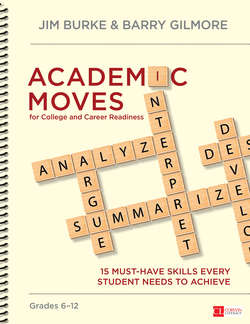Читать книгу Academic Moves for College and Career Readiness, Grades 6-12 - Jim Burke - Страница 25
На сайте Литреса книга снята с продажи.
The Main Idea
ОглавлениеStudents argue every day. But arguing with your parents about cleaning your room is not the same as constructing an intellectual argument. In the latter case, the word argument describes the process of stating and supporting a claim, as well as taking into account possible counterclaims. An academic argument is not one you win or lose, and it’s not simply an opinion; it’s a balanced and reasoned process that requires accountability.
Underlying Skills:
Engage ideas critically. Passive learning is not an option when students write even the simplest pieces, much less sophisticated arguments. Students must approach topics and texts with critical thinking in order to argue effectively.
Consider multiple sides of an issue or idea. An ability to consider counterarguments (easily represented by a Venn diagram) is crucial to structuring a solid argument.
Support an idea. Arguments demand evidence tied thoughtfully to statements of position (such as a thesis statement or hypothesis). You can illustrate a point when describing something (“The cups in the cafeteria are all red”), but arguing a point requires more nuanced detail (“The cups in the cafeteria should be blue”) and demands reasons and evidence.
Argue: provide reasons or evidence in order to support or oppose something; persuade another by reason or evidence; contend or maintain that something is true
Core Connections
Delineate and evaluate the argument and specific claims in a text, including the validity of the reasoning as well as the relevance and sufficiency of the evidence (R8)
Write arguments to support claims in an analysis of substantive topics or texts, using valid reasoning and relevant and sufficient evidence (W1)
Construct and present oral and written arguments supported by empirical evidence and scientific reasoning to support or refute an explanation or a model for a phenomenon or a solution to a problem (NGSS, MS-PS2–4)
